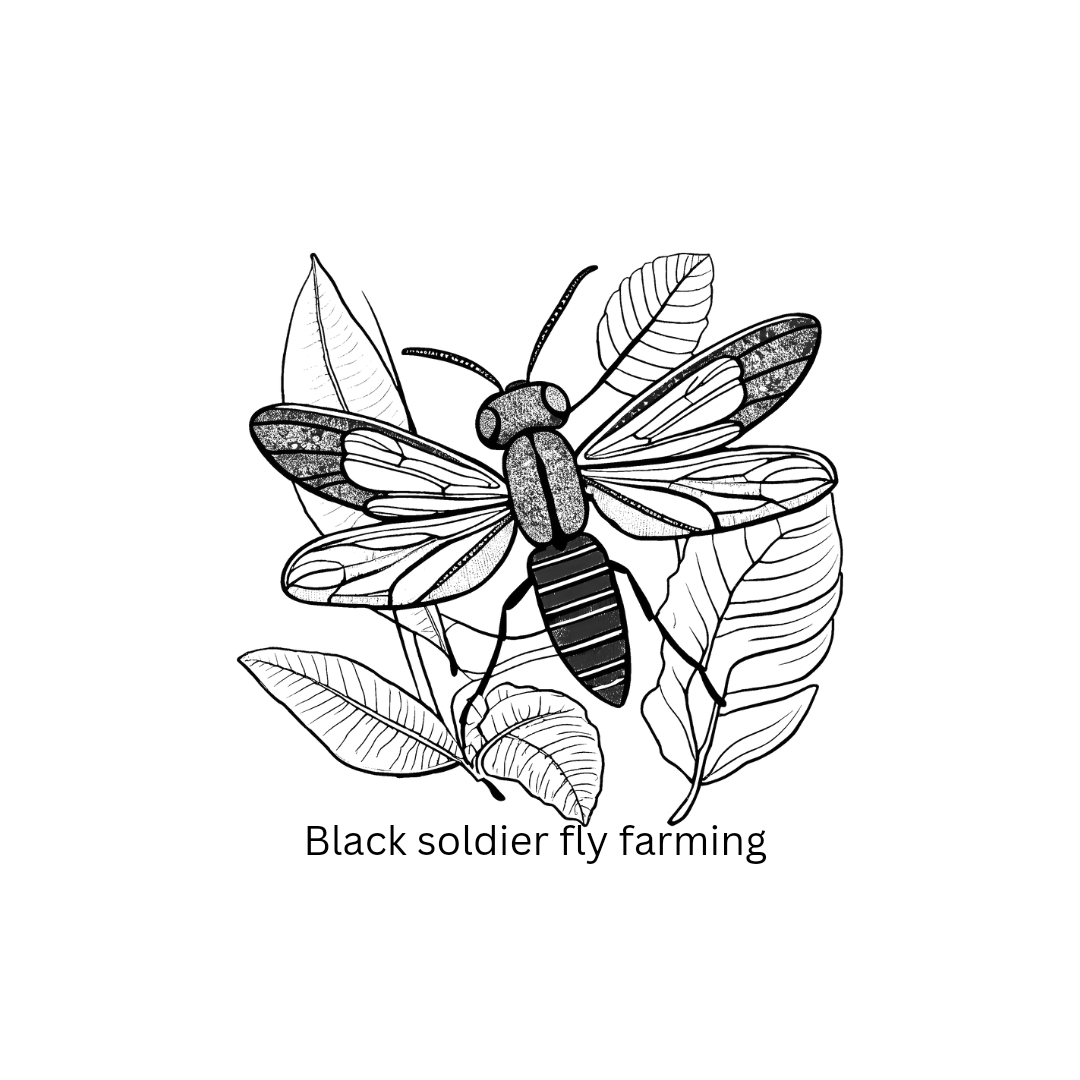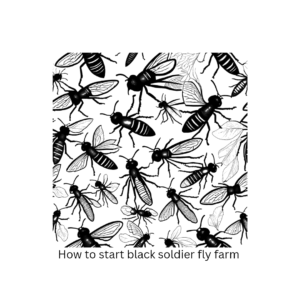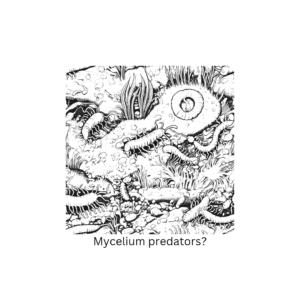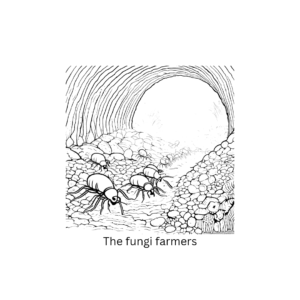Black Soldier Fly farming is rapidly gaining popularity for its ability to reduce organic waste, produce high-protein animal feed, and offer a sustainable business model. Whether you’re a hobbyist looking to reduce food waste at home or an entrepreneur exploring eco-friendly business ideas, Black Soldier Fly (BSF) larvae provide a unique opportunity. This article dives into what Black Soldier Flies are, how to use them for composting and animal feed, and the growing business potential in BSF farming.
What is the Black Soldier Fly?
The Black Soldier Fly (Hermetia illucens) is a non-pest insect known for its ability to efficiently decompose organic waste and produce larvae rich in protein. Unlike common houseflies, Black Soldier Flies do not carry diseases, making them a safer and more eco-friendly option for waste management and protein production.
Key Characteristics of Black Soldier Flies:
Efficient Waste Decomposers: BSF larvae can rapidly break down food scraps, manure, and organic waste, producing nutrient-rich compost.
High-Protein Animal Feed: BSF larvae are rich in protein, fat, and essential nutrients, ideal for livestock, aquaculture, and pet feed.
Eco-Friendly Insect: Black Soldier Flies do not pose a threat to human health and can be farmed in both large-scale and small-scale operations.
How to Use Black Soldier Flies for Composting and Waste Management
BSF larvae are commonly used to reduce food waste and manure, converting it into high-quality compost. Whether you’re looking to reduce waste at home or manage waste for a farm, Black Soldier Fly larvae offer an efficient solution.
1. Organic Waste Reduction
BSF larvae can consume large amounts of organic material, including food scraps, kitchen waste, and animal manure. They quickly break down these materials, reducing waste volume by up to 50% and leaving behind nutrient-rich compost.
Food Waste Management: Black Soldier Fly larvae can process leftover fruits, vegetables, and even spoiled food, turning waste into compost or biofertilizer.
Livestock Manure Composting: On farms, BSF larvae help manage manure from cows, chickens, and pigs, reducing pathogens and creating valuable compost for crop growth.
2. High-Quality Compost Production
The frass (excrement) produced by BSF larvae is a powerful biofertilizer rich in nutrients and beneficial microbes. It can be used to improve soil health, enhance crop yields, and promote sustainable agriculture.
Compost for Gardens: The compost created by BSF larvae can be applied to home gardens, improving plant growth and soil quality.
Large-Scale Composting Systems: For businesses and farms, Black Soldier Fly larvae can be integrated into composting operations to reduce waste and produce valuable organic fertilizer.
Using Black Soldier Fly Larvae as Animal Feed
One of the most valuable uses of Black Soldier Fly larvae is as a sustainable, high-protein animal feed. The larvae are packed with essential nutrients, making them an excellent alternative to traditional feed sources like soy or fishmeal.
1. Poultry and Livestock Feed
BSF larvae are ideal for feeding chickens, ducks, pigs, and other livestock. They provide a protein-rich diet that promotes healthy growth, improves egg production, and reduces the environmental impact of animal farming.
High-Protein Feed for Chickens: Chickens fed on BSF larvae grow healthier and produce eggs with stronger shells due to the larvae’s rich nutritional profile.
Alternative Feed for Pigs: Pigs can also thrive on a diet supplemented with BSF larvae, reducing the need for expensive, grain-based feed.
2. Aquaculture and Fish Farming
BSF larvae are increasingly used in aquaculture as a sustainable feed option for fish like tilapia, trout, and catfish. Fish farmers benefit from lower feed costs and reduced reliance on environmentally damaging fishmeal.
Sustainable Fish Feed: Replacing fishmeal with BSF larvae reduces overfishing and provides a high-quality, eco-friendly feed option for fish farms.
3. Reptile and Pet Feed
Hobbyists raising reptiles, birds, or other exotic pets can also benefit from BSF larvae. The larvae are easy to breed at home and offer a nutritious, natural diet for pets.
Ideal for Reptiles: BSF larvae are a popular choice for feeding reptiles, such as bearded dragons and geckos, due to their high protein and calcium content.
Black Soldier Fly Farming as a Business Opportunity
The demand for sustainable waste management and protein sources is driving the growth of Black Soldier Fly farming. Entrepreneurs can capitalize on this by offering services that process organic waste, produce animal feed, or sell compost.
1. Waste Management Business
Black Soldier Fly larvae are an efficient solution for reducing food waste and manure. Businesses can set up BSF farms to manage organic waste from restaurants, grocery stores, and farms, reducing landfill use and creating valuable compost.
Food Waste Recycling: Offer food waste management services by using BSF larvae to process waste from food businesses, producing compost or animal feed.
Agricultural Waste Solutions: Partner with local farms to process livestock manure, reducing waste and producing organic fertilizer.
2. Protein Production and Animal Feed
Black Soldier Fly larvae can be harvested, dried, and processed into protein-rich animal feed, which can be sold to poultry farms, fish farms, and pet stores. This creates a sustainable alternative to traditional feed production.
Commercial Feed Production: Produce and sell BSF larvae as an eco-friendly protein source for livestock and aquaculture.
Dried Larvae for Pets: Package and sell dried larvae to pet stores or online, targeting reptile owners and exotic pet enthusiasts.
3. Selling Black Soldier Fly Compost
The compost (frass) produced by BSF larvae is highly valued as a biofertilizer. Farmers, gardeners, and nurseries are always looking for organic solutions to enhance soil health, creating a market for BSF compost.
Organic Fertilizer Business: Sell BSF compost to organic farms and nurseries, or create a line of eco-friendly fertilizers for home gardeners.
Black Soldier Fly Farming for Hobbyists
Black Soldier Fly farming is not just for businesses—it’s also a great hobby for individuals who want to reduce household waste or raise their own feed for pets.
1. Home Waste Reduction and Composting
Hobbyists can set up small BSF bins to process kitchen scraps and reduce household waste. BSF larvae work quickly, converting food scraps into compost that can be used in home gardens.
Indoor and Outdoor BSF Bins: Small BSF farms can be kept indoors or outdoors, depending on your climate. They require minimal maintenance and can process a variety of organic materials.
Garden Composting: Use the compost from BSF larvae to fertilize home gardens, boosting plant growth and soil fertility.
2. Raising Larvae for Pets
Many reptile and bird owners raise BSF larvae to provide a nutritious and sustainable food source for their pets. A small colony of BSF can easily supply a continuous source of larvae for personal use.
DIY Pet Feed: By raising your own BSF larvae, you can reduce your reliance on commercial pet feed and ensure your pets are getting high-quality, fresh larvae.
Conclusion: Why Black Soldier Fly Farming is the Future of Sustainability
Black Soldier Fly farming presents a unique opportunity for both businesses and hobbyists to contribute to sustainability. Whether you’re looking to reduce waste, produce high-quality animal feed, or start a profitable business, BSF larvae offer an eco-friendly solution. As global demand for sustainable agriculture and waste management grows, Black Soldier Fly farming is becoming an essential part of the future.




